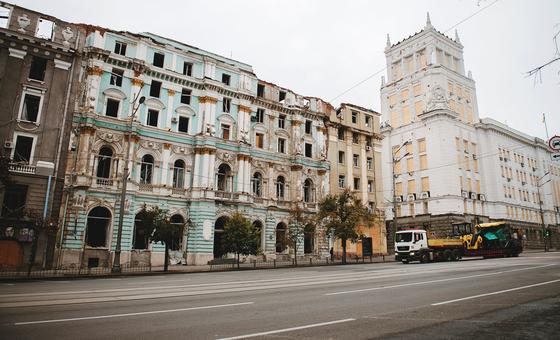Almost a year into the war in Ukraine – and amid new missile strikes targeting the eastern city of Kharkiv on Wednesday – top rights experts issued a strong appeal for the deliberate destruction of the country’s cultural treasures by Russian forces to stop.
According to humanitarian workers, at least six people were killed on Tuesday after Russian missiles struck a busy street in the city of Kherson. Most of the victims were standing at a bus stop, UN Spokesperson Stéphane Dujarric told journalists in New York that day.
Identities and shelters targeted
The UN-appointed independent rights experts also expressed concern at the “continued denigration of the history and identity of Ukrainian people as a justification for war and hatred”.
The experts, who report to the UN Human Rights Council as mandated Special Rapporteurs, cited reports that culturally significant locations in Ukraine had been intentionally targeted, when they should be protected, in accordance with international law, specifically the 1954 Hague Convention for the Protection of Cultural Property in the Event of Armed Conflict.
Important Ukrainian cultural locations that have been hit include buildings “clearly marked” as shelters for residents, including children, as well as museums, libraries and churches. “The indiscriminate and disproportionate attacks on densely populated areas, and the damage caused to civilian infrastructure in the process, are of such magnitude as to suggest a deliberate campaign of destruction,” the experts said in a statement.
More than 240 Ukrainian heritage sites are estimated to have been damaged since the Russian invasion on 24 February last year, according to the UN cultural, educational and scientific agency UNESCO.
But the true number of attacks could be over 1,000, the rights experts said.
Twisted narrative
“Repositories of Ukrainian literature, museums, and historical archives – are being destroyed, and there is a widespread narrative of demonisation and denigration of Ukrainian culture and identity promoted by Russian officials, along with calls for ideological repression and strict censorship in the political, cultural and educational spheres. Let us be clear: the Ukrainian people have a right to their identity. Nobody can violate this right.”
In eastern Ukraine and Crimea, annexed by Russia in March 2014, the experts maintained that efforts were being made “to erase local culture, history and language” in cultural and educational institutions.
Instead, communities faced seeing them replaced with Russian language and with Russian and Soviet history and culture.
Ukrainian books labelled ‘extremist’
“Ukrainian history books and literature deemed to be ‘extremist’ have been seized from public libraries in cities and towns in the occupied territory of Luhansk, Donetsk, Chernihiv, and Sumy Oblasts and destroyed by the occupying power,” the experts reported. “The same has been reported about school history manuals in certain cities.”
Special Rapporteurs and independent experts are appointed by the Geneva-based Human Rights Council to examine and report back on a specific human rights theme or a country situation. The positions are honorary and the experts are not UN staff, nor are they paid for their work.

